The HP EliteBook X G1i and HP EliteBook X Flip G1i are AI computers designed for mainstream business use. These laptops are highly efficient, even under heavy workloads, allowing users to perform demanding tasks without quickly draining the battery. They come equipped with a built-in Endpoint Security Controller, which helps ensure that user data remains secure and protected. In case of a malware attack, the system automatically isolates the threat to protect the device.
For added security, these laptops can be remotely located, locked, and configured to prevent unauthorized data deletion. The package includes a three-year license for HP Wolf Pro Security Edition, which allows users to manage all security features from a single platform.
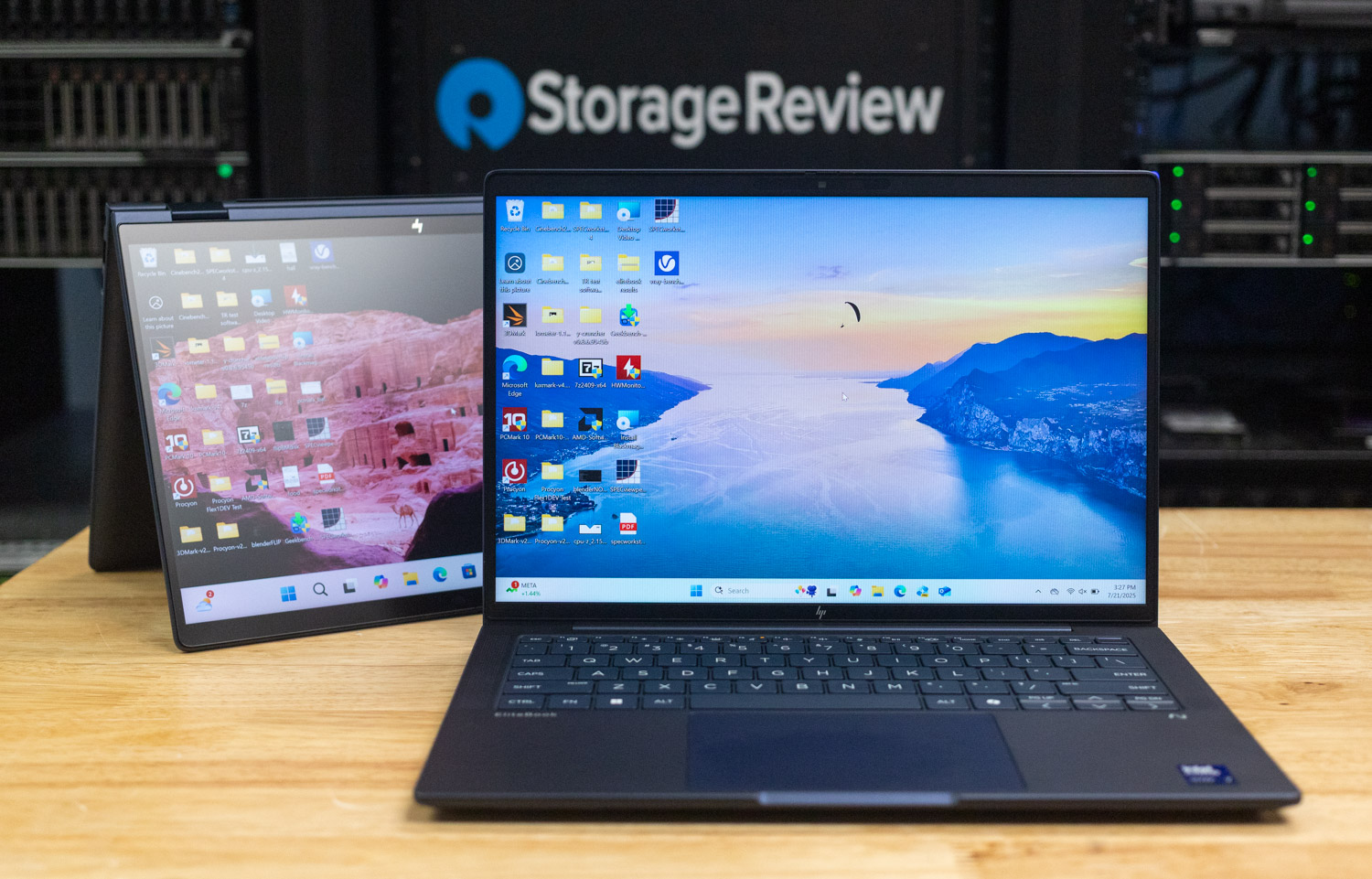
The HP EliteBook X G1i features the Intel Core Ultra 7 processor. The X GLi base model starts at $1,750.00 at the time of this review, while the X Flip G1i starts at $1,499.00. Both models share the same 14-inch WUXGA (1920 x 1200) screen as well as most of the other internal components. They have integrated Intel Arc Graphics, 32GB of RAM, and a 1TB SSD. They feature the latest wireless/Bluetooth cards, a spill-resistant backlit keyboard, a 5 MP IR AI camera, and the HP Active Pen G3.
HP EliteBook X G1i Specifications (Windows 11 Pro)
| Specifications | |
|---|---|
| Operating System | Windows 11 Pro |
| Processor Family | Intel® Core Ultra 7 processor |
| Processor | Intel Core Ultra 7 258V (up to 4.8 GHz with Intel Turbo Boost Technology, 12 MB L3 cache, 8 cores, 8 threads) |
| Graphics | Integrated: Intel Arc Graphics |
| Memory | 32 GB LPDDR5x-8533 MT/s (onboard) |
| Internal Drive | 1 TB PCIe Gen4 NVMe TLC M.2 SSD |
| Display | 14″ diagonal, WUXGA (1920 x 1200), touch, IPS, anti-glare, 500 nits, 100% sRGB |
| Security Software License | HP Wolf Pro Security Edition (3 years) |
| External I/O Ports | 2x Thunderbolt 4 (USB Type-C, 40Gbps, USB PD, DisplayPort 2.1, HP Sleep and Charge), 1x USB Type-C (10Gbps, USB PD, DisplayPort 1.4), 1x HDMI 2.1, 1x stereo headphone/microphone combo, 1x USB Type-A (5Gbps, powered) |
| Audio Features | Audio by Poly Studio, quad stereo speakers with discrete amplifiers, integrated dual array microphones |
| Webcam | 5 MP IR camera |
| Keyboard | HP Premium Keyboard – spill-resistant, full-size, backlit keyboard with DuraKeys |
| Pointing Device | Clickpad with multi-touch gesture support |
| Wireless Technology | Intel Wi-Fi 7 BE201 (2×2) and Bluetooth 5.4 wireless card |
| Power Supply | HP 65 W USB Type-C GaN slim power adapter |
| Battery | HP Long Life 6-cell, 68 Wh Li-ion polymer |
| Sensors | Gyroscope, Thermal sensor, Hall effect sensor, Color sensor with Ambient light sensing, Inertial Measurement Unit sensor |
| Energy Efficiency | TCO Certified, ENERGY STAR certified |
| Dimensions (W x D x H) | 12.36 x 8.66 x 0.41 in (front); 12.36 x 8.66 x 0.59 in (rear) |
| Weight | Starting at 2.6 lb |
| Warranty | 3-year (3/3/0) limited warranty (parts and labor), no on-site repair. Terms vary by country; certain restrictions apply. |
Design and Features
The EliteBook X G1i and EliteBook X Flip G1i feature a navy-blue design that extends to the casing, keyboard, and touchpad. While the design is straightforward and lacks flair, this simplicity aligns with the purpose of a business laptop, where a shiny appearance is not the priority.
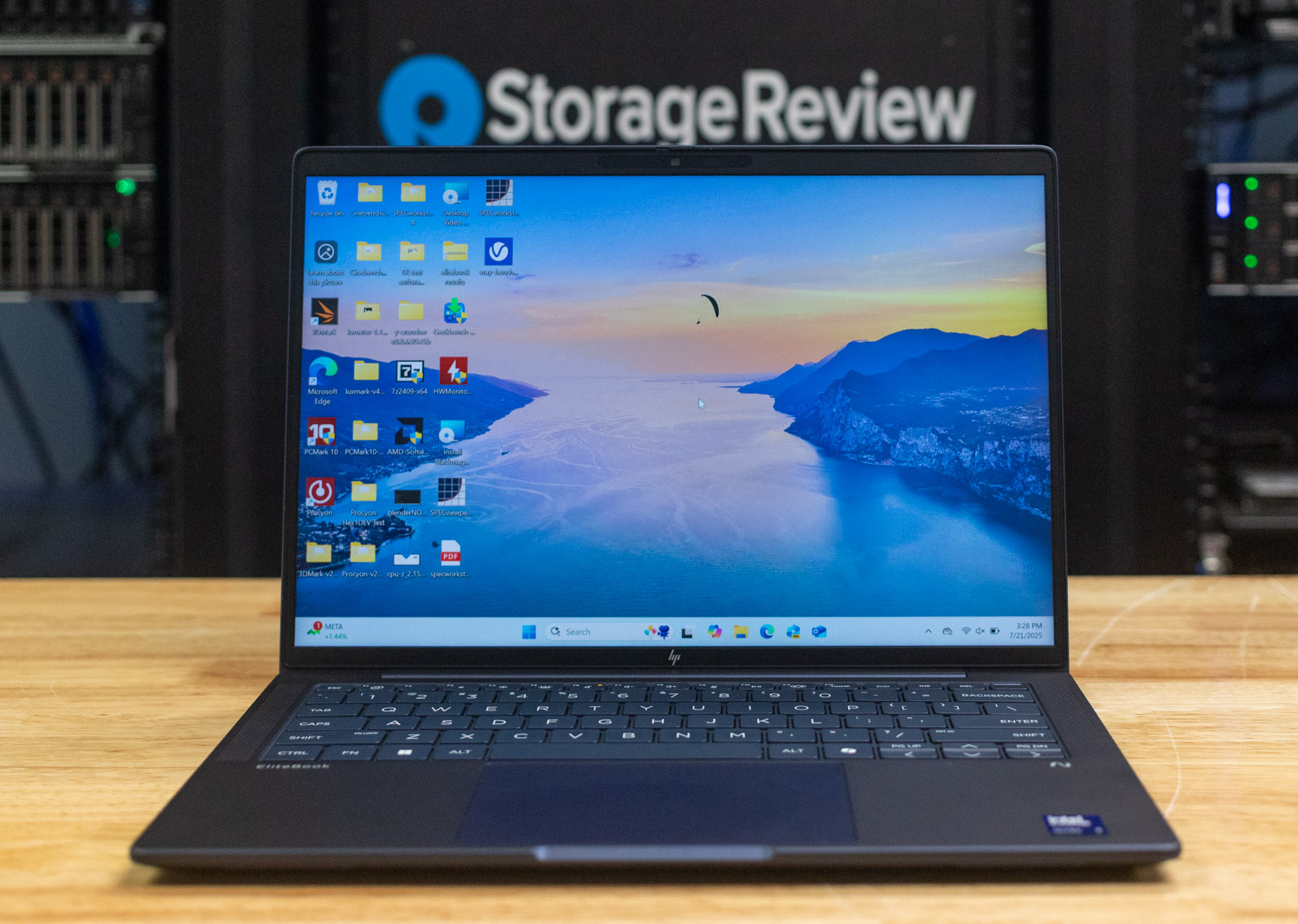
The aluminum chassis feels smooth, sturdy, and durable, exhibiting minimal flex. Measuring 12.36 x 8.66 x 0.41–0.59 inches and weighing 3.09 pounds, the EliteBooks are slim and lightweight, despite featuring a 14-inch display. The rounded edges make them comfortable to carry. Overall, the quality of the notebooks is excellent, and they incorporate 65% recycled metal in their construction.
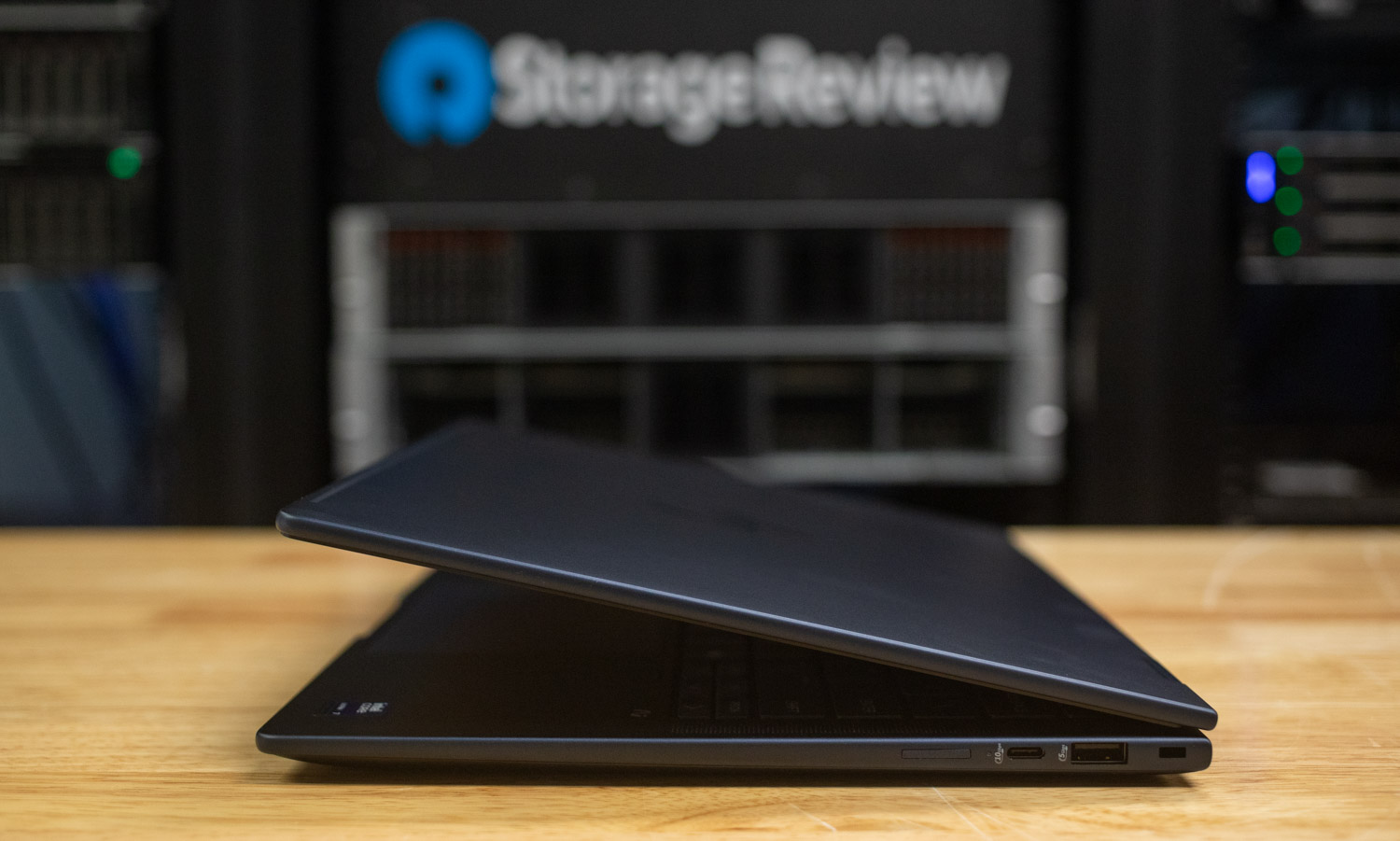
Port selection varies sufficiently to preclude the need for adapters or extenders. The left ports include two Thunderbolt 4, one HDMI 2.1 monitor output, and one stereo headphone/microphone combo jack. On the right, you’ll find one 10Gb/s USB Type-C port, one 5Gb/s USB Type-A port, and a cable lock slot.
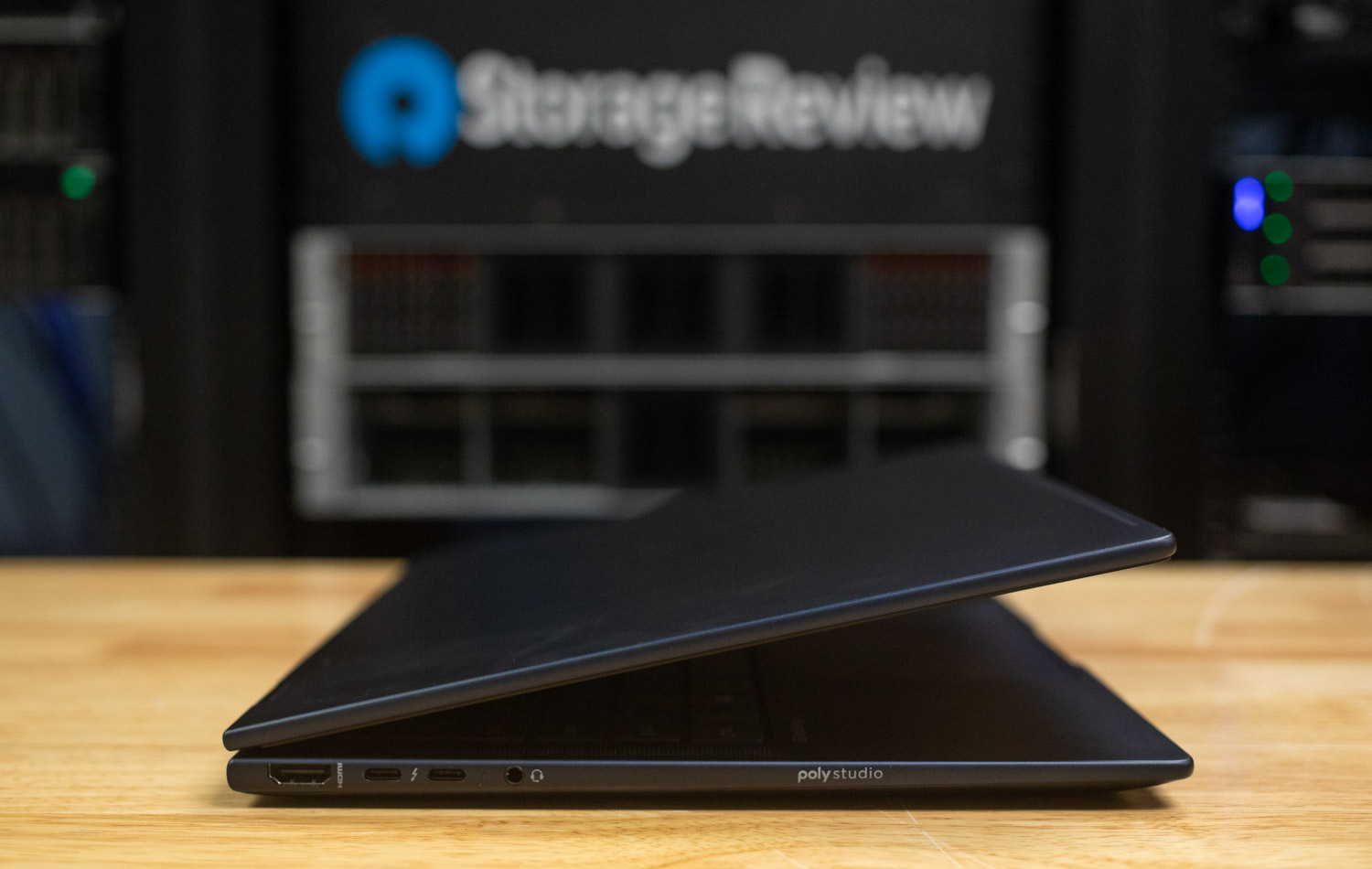
The laptops come with a similar keyboard that has a familiar layout and comfortable island-style keys. The backlighting works well in low-light conditions, and the font on the keycaps is easily readable. All the arrow keys are the same size, which is small. The power button, located at the top right, also functions as a fingerprint reader. The keyboard provides a pleasant typing experience, featuring a soft, shallow throw that generates minimal keystroke noise. The keyboard deck is sturdy and shows almost no flex. Additionally, the touchpad is a great size, with a subtle matte finish that allows your finger to glide smoothly across its surface.
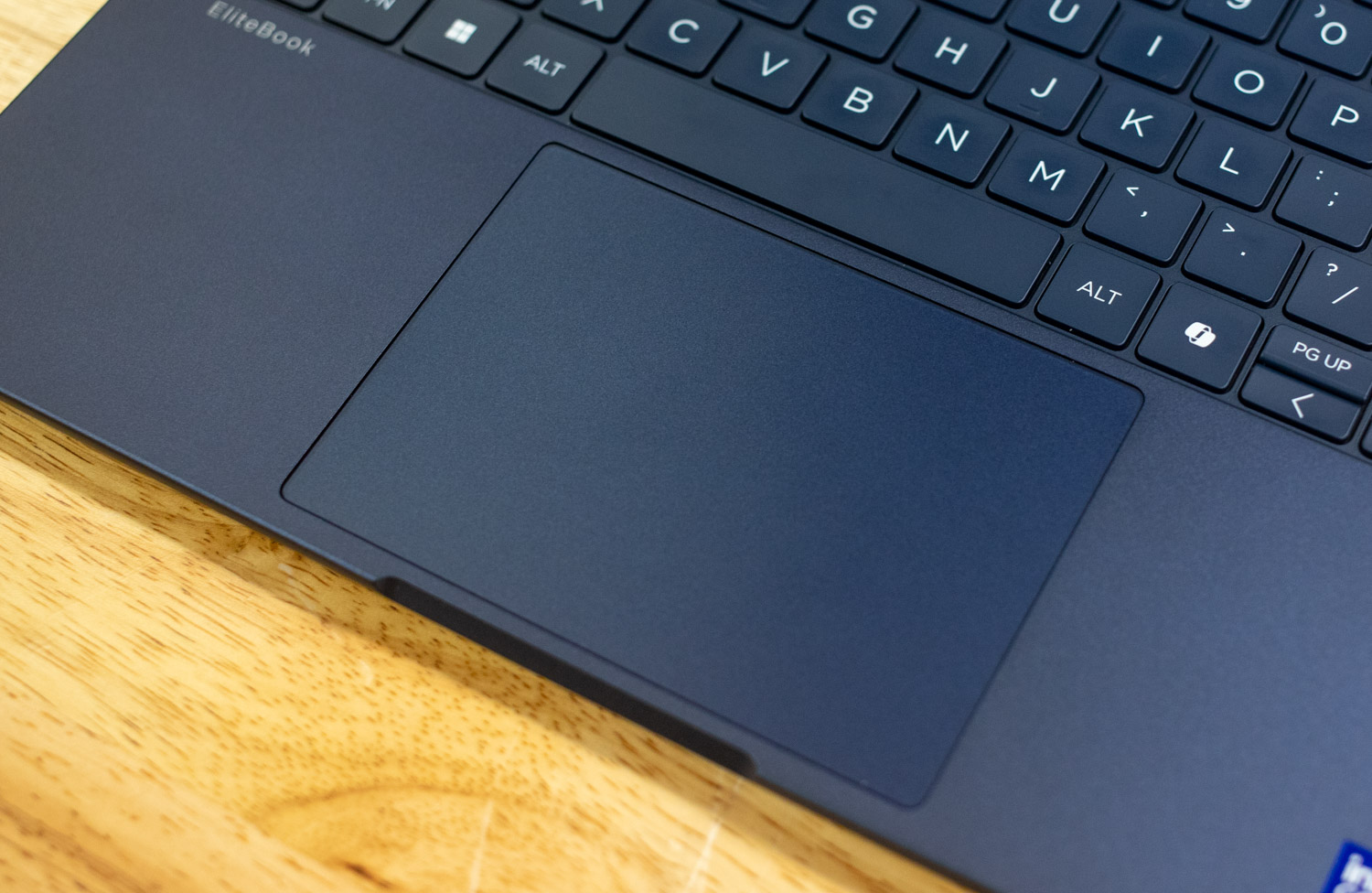
The IR webcam located above the display provides an additional biometric option. HP includes a sliding privacy shutter.
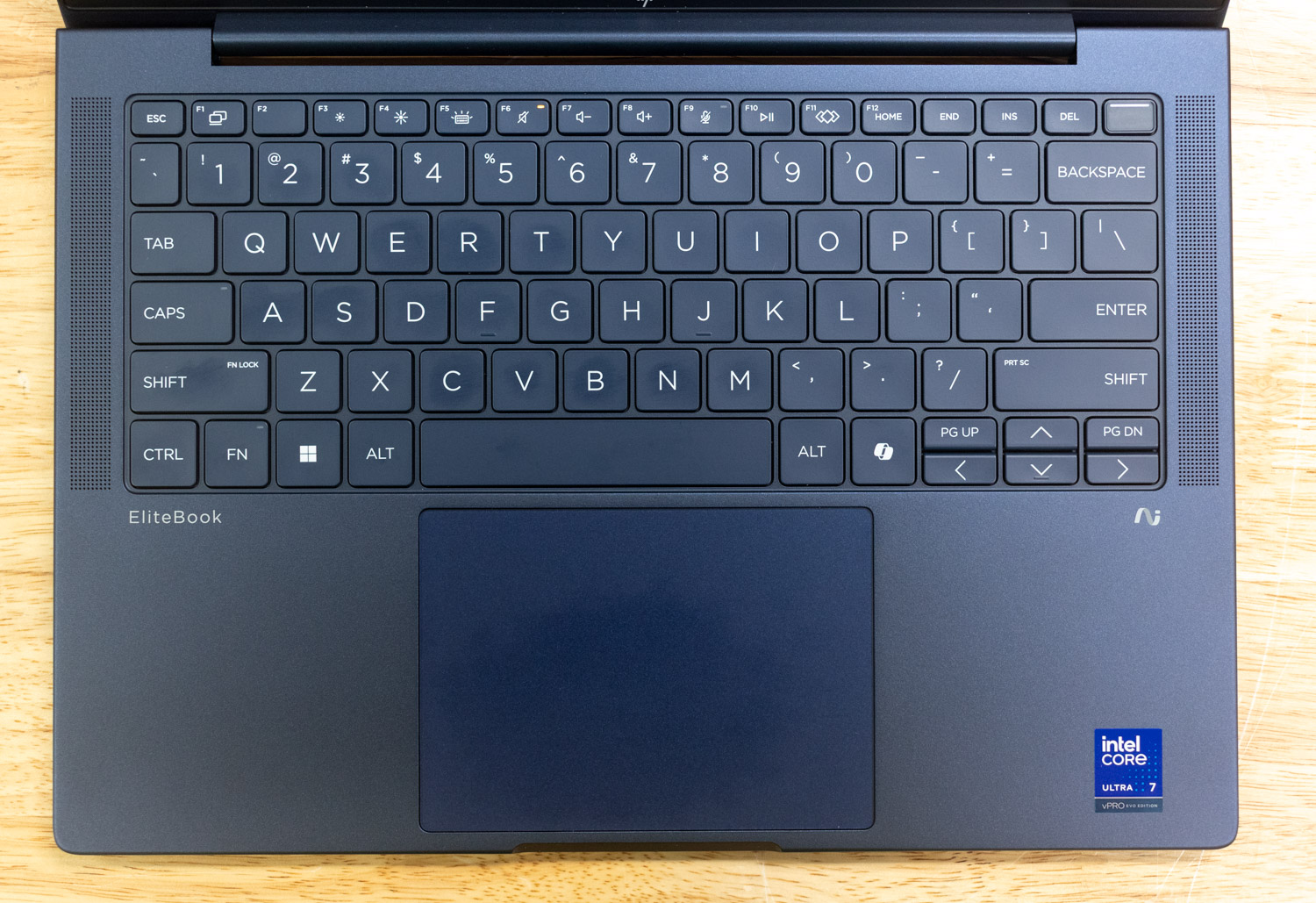
The Intel Core Ultra 7 258V processor lets thin laptops like these enter the world of AI. The dedicated neural processing unit delivers 48 TOPS of AI performance. The processor utilizes four high-performance P-cores and four low-power, efficient LPE-cores, operating at a base frequency of 2.2GHz and up to 4.8GHz, with Intel Turbo Boost Technology.
Display
The HP EliteBook X G1i and HP EliteBook X Flip G1i feature a 1920 x 1200 IPS panel with 100% sRGB spectrum coverage. This is fantastic for laptops of this caliber. A moderate brightness of 400 nits for the flip version and 500 nits for the regular model will be sufficient for most tasks. The Flip model also features a touchscreen and comes with a USB-C chargeable HP Active Pen G3.
Upgradeability
The bottom panel can be removed by loosening four screws.
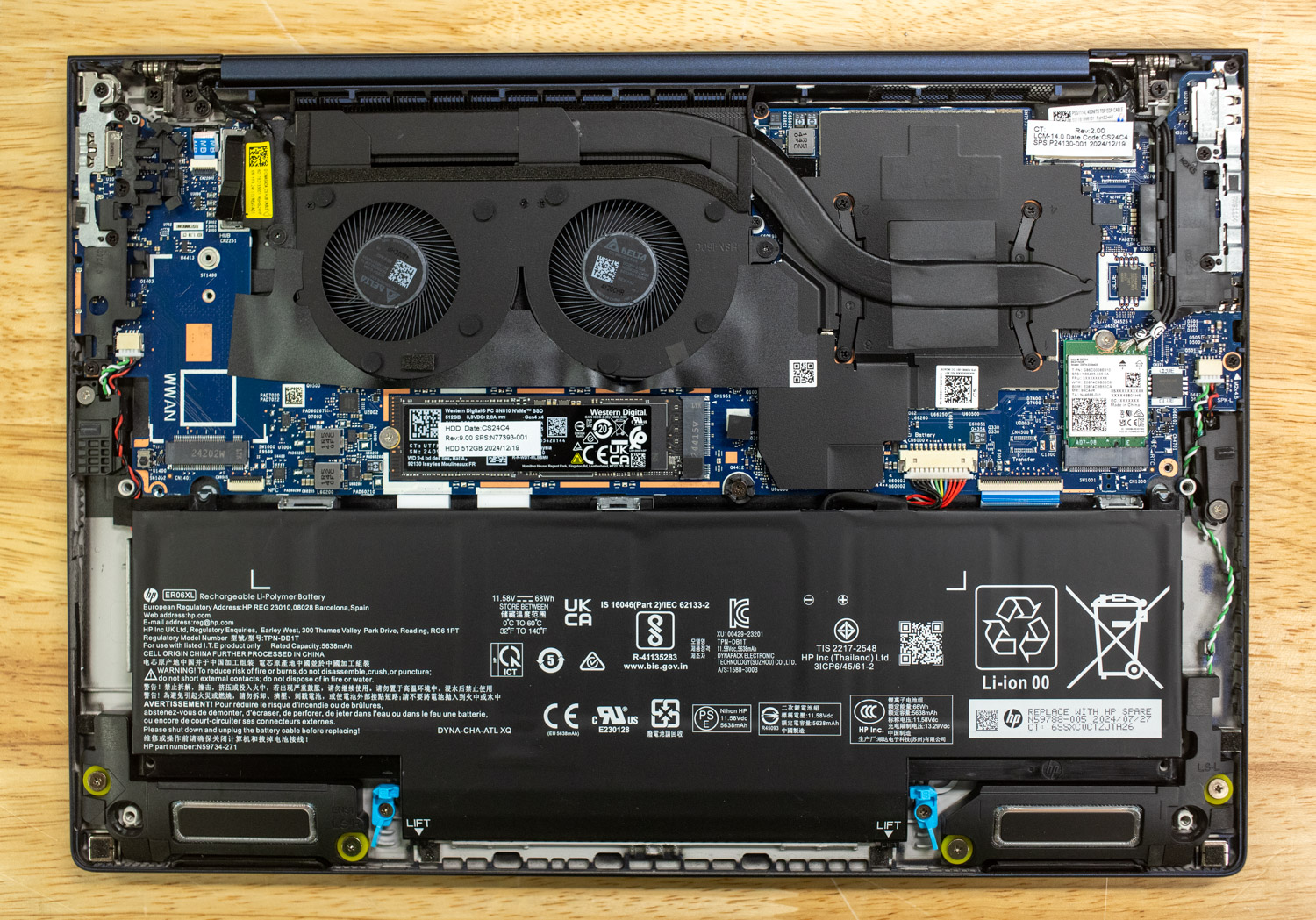
The only changeable components are the battery and M.2 SSD. HP includes a heatsink to keep the SSD cool. Regarding temperatures, the system remained quiet during regular operation. With the CPU under heavy load, fan noise was audible but at a whisper level.
Performance
For these tests, we will be comparing the HP EliteBook X G1i and the HP EliteBook X Flip G1i to these laptops:
SPECworkstation 4
The SPECworkstation 4.0 benchmark is a comprehensive tool that evaluates all key aspects of workstation performance. It offers a real-world measure of CPU, graphics, accelerator, and disk performance, ensuring professionals have the data to make informed decisions about their hardware investments. The benchmark includes a dedicated set of tests focusing on AI and ML workloads, including data science tasks and ONNX runtime-based inference tests, reflecting the growing importance of AI/ML in workstation environments. It encompasses seven industry verticals and four hardware subsystems, providing a detailed and relevant measure of the performance of today’s workstations.
For all but one category, the HP EliteBook X G1i performed slightly better than the HP EliteBook X Flip G1i. The Energy category (0.89 non-Flip, 0.87 Flip) yielded results comparable to, but higher than, those of the Lenovo ThinkPad X9 Aura Edition. A similar trend followed for Financial Services (0.62 non-flip, 0.58 flip), Life Sciences (0.87 non-flip, 0.83 flip), and Media & Entertainment (0.88 non-flip, 0.87 flip). It continues the trend of outpacing the Lenovo ThinkPad, as seen in the Product Design section (0.99 non-flip, 1.01 flip) and for Productivity & Development (both 0.72). Generally, the findings indicate that these laptops are not designed for heavier professional workloads.
| SPECworkstation 4.0.0 (Higher is better) | HP EliteBook X G1i | HP EliteBook X Flip G1i | HP ZBook Ultra G1a 14″(Ryzen AI MAX+ PRO 395) | Lenovo ThinkPad X9 14 Aura Edition (Core Ultra 5 226) | HP EliteBook X G1a (Ryzen AI 9 HX 375) |
| Energy | 0.89 | 0.87 | 2.20 | 0.67 | 1.19 |
| Financial Services | 0.62 | 0.58 | 1.60 | 0.47 | 1.12 |
| Life Sciences | 0.87 | 0.83 | 2.20 | 0.71 | 1.33 |
| Media & Entertainment | 0.88 | 0.87 | 1.90 | 0.78 | 1.32 |
| Product Design | 0.99 | 1.01 | 1.74 | 0.93 | 1.16 |
| Productivity & Development | 0.72 | 0.72 | 1.03 | 0.65 | 0.75 |
Luxmark
Luxmark is a GPU benchmark that utilizes LuxRender, an open-source ray-tracing renderer, to evaluate a system’s performance in handling highly detailed 3D scenes. This benchmark is relevant for assessing the graphical rendering capabilities of servers and workstations, especially for visual effects and architectural visualization applications, where accurate light simulation is crucial.
The HP EliteBook X G1i scored 3,219 in Hallbench and 1,549 in the Food Scene. Similarly, the HP EliteBook X Flip F1i scored 3,260 in Hallbench and 1,473 in the Food scene. They show promise, performing marginally faster than the Lenovo ThinkPad X9 Aura Edition, with output scores of 2,870 in Hallbench and 1,329 in Food. The HP EliteBooks seem to trend towards power efficiency rather than the performance and potency of the HP ZBook Ultra G1a 14″.
| Luxmark (Higher is better) | HP EliteBook X G1i | HP EliteBook X Flip G1i | HP ZBook Ultra G1a 14″(Ryzen AI MAX+ PRO 395) | Lenovo ThinkPad X9 14 Aura Edition (Core Ultra 5 226) | HP EliteBook X G1a (Ryzen AI 9 HX 375) |
| Hallbench | 3,219 | 3,260 | 7,833 | 2,870 | 2,056 |
| Food | 1,549 | 1,473 | 3,915 | 1,329 | 1,027 |
7-Zip Compression
The 7-Zip Compression Benchmark evaluates CPU performance during compression and decompression tasks, measuring ratings in GIPS (Giga Instructions Per Second) and CPU usage. Higher GIPS and efficient CPU usage indicate superior performance.
The HP EliteBook X G1i achieves a total rating of 50.672 GIPS, with a Compression Rating of 49.298 GIPS and a Decompression Rate of 52.045 GIPS. CPU usage stays under 720%, suggesting it is limited by fewer available threads.
The HP EliteBook X Flip G1i is built with the same Intel Core Ultra 7 CPU and performs nearly identically to the HP EliteBook X G1i. Its total rating is 50,574 GIPS, with a Compression Rating of 49.160 GIPS and Decompression of 51.988 GIPS.
The Intel Core Ultra 7 CPU performs similarly to the modest Core Ultra 5 226V CPU on the Lenovo ThinkPad X9 14 Aura Edition. The 8-core, 8-thread build of the Intel Core Ultra 7 limits these laptops’ capabilities for this test.
| 7-Zip Compression Benchmark (Higher is Better) | HP EliteBook X G1i (Intel Core Ultra 7) | HP EliteBook X Flip G1i (Intel Core Ultra 7) | HP ZBook Ultra G1a 14″(Ryzen AI MAX+ PRO 395) | Lenovo ThinkPad X9 14 Aura Edition (Core Ultra 5 226V) | HP EliteBook X G1a (Ryzen AI 9 HX 375) |
| Compressing | |||||
| Current CPU Usage | 695% | 687% | 2,868% | 697% | 2,177% |
| Current Rating/Usage | 7.203 GIPS | 7.196 GIPS | 4.883 GIPS | 6.219 GIPS | 4.091 GIPS |
| Current Rating | 50.075 GIPS | 49.160 GIPS | 140.061 GIPS | 43.375 GIPS | 89.082 GIPS |
| Resulting CPU Usage | 684% | 683% | 2,855% | 697% | 2,189% |
| Resulting Rating/Usage | 7.202 GIPS | 7.196 GIPS | 4.890 GIPS | 6.430 GIPS | 4.170 GIPS |
| Resulting Rating | 49.298 GIPS | 49.160 GIPS | 139.617 GIPS | 44.816 GIPS | 91.269 GIPS |
| Decompressing | |||||
| Current CPU Usage | 745% | 748% | 2,904% | 742% | 2,103% |
| Current Rating/Usage | 6.885% | 6.963 GIPS | 6.029 GIPS | 6.241 GIPS | 5.327 GIPS |
| Current Rating | 51.275 GIPS | 52.086 GIPS | 175.104 GIPS | 46.309 GIPS | 112.052 GIPS |
| Resulting CPU Usage | 756% | 753% | 2,887% | 761% | 2,103% |
| Resulting Rating/Usage | 6.883 GIPS | 6.901 GIPS | 6.028 GIPS | 6.226 GIPS | 5.414 GIPS |
| Resulting Rating | 52.045 GIPS | 51.988 GIPS | 174.046 GIPS | 47.407 GIPS | 113.859 GIPS |
| Total Rating | |||||
| Total CPU Usage | 720% | 718% | 2,871% | 729% | 2146% |
| Total Rating/Usage | 7.042 GIPS | 7.048 GIPS | 5.459 GIPS | 6.328 GIPS | 4.792 GIPS |
| Total Rating | 50.672 GIPS | 50.574 GIPS | 156.832 GIPS | 46.112 GIPS | 102.564 GIPS |
Blackmagic RAW Speed Test
The Blackmagic RAW Speed Test is a performance benchmarking tool that measures a system’s capabilities for handling video playback and editing using the Blackmagic RAW codec. It evaluates how well a system can decode and playback high-resolution video files, providing frame rates for CPU- and GPU-based processing.
During this test, the HP EliteBook X G1i and HP EliteBook X Flip G1i reported scores of 41 fps (8K CPU) and 54 fps (8K OpenCL). The EliteBooks outpaced the Lenovo ThinkPad X9 14 Aura Edition by 10 points in each category.
| Blackmagic RAW Speed Test | HP EliteBook X G1i (Intel Core Ultra 7) | HP EliteBook X Flip G1i (Intel Core Ultra 7) | HP ZBook Ultra G1a 14″(Ryzen AI MAX+ PRO 395) | Lenovo ThinkPad X9 14 Aura Edition (Core Ultra 5 226) | HP EliteBook X G1a (Ryzen AI 9 HX 375) |
|---|---|---|---|---|---|
| 8K CPU | 41 | 41 | 102 | 33 | 67 |
| 8K OPENCL | 54 | 54 | 78 | 42 | 30 |
Blackmagic Disk Speed Test
The Blackmagic Disk Speed Test evaluates storage performance by measuring read and write speeds, providing insights into a system’s ability to handle data-intensive tasks, such as video editing and large file transfers. The HP EliteBook X G1i (Top) ended up outputting 3,565.3 MB/s write and 3,638.2 MB/s read speeds. For the HP EliteBook X Flip G1i (Bottom), results were 3,396.9 MB/s write with 4,319.3 MB/s read. These results are expected for this product’s specs and price range. However, the HP EliteBook X Flip displays a noticeably higher read speed, which differs from the usual trend of these products testing virtually the same.
| Disk Speed Test (higher is better) | HP ZBook Ultra G1a 14″(Ryzen AI MAX+ PRO 395) | HP EliteBook X Flip G1i (Intel Core Ultra 7) | HP ZBook Ultra G1a 14″(Ryzen AI MAX+ PRO 395) | Lenovo ThinkPad X9 14 Aura Edition (Core Ultra 5 226) | HP EliteBook X G1a (Ryzen AI 9 HX 375) |
| Read | 3396.9 MB/s | 4319.3 MB/s | 4547.3 MB/s | 3733.0 MB/s | 3799.1 MB/s |
| Write | 3565.3 MB/s | 3639.2 MB/s | 4264.8 MB/s | 2633.2 MB/s | 3975.7 MB/s |
PCMark 10 Battery Life
To measure the battery life of mobile systems, we leverage PCMark 10. It includes a Modern Office benchmark, providing a realistic assessment of battery life during typical workday tasks. It simulates everyday office activities, such as writing documents, browsing the web, and participating in video conferences, with built-in periods of inactivity to mirror how people use their laptops. This isn’t just about peak performance; it focuses on sustained usage under a moderate workload. It is helpful for understanding how long you can expect a laptop to last through a day of office work.
| Notebook | PCMark 10 Modern Office Result |
|---|---|
| HP EliteBook X G1i Flip | 24 hours & 34 minutes |
| HP EliteBook X G1i | 23 hours & 31 minutes |
| 14″ HP EliteBook X G1a | 10 hours & 48 minutes |
| 14″ HP ZBook Ultra G1a | 10 hours & 35 minutes |
| 14″ Lenovo ThinkPad X9 14 Aura Edition | 15 hours & 10 minutes |
The test operates in 10-minute cycles, balancing active tasks with periods of inactivity. Specifically, the Writing and Web Browsing workloads involve roughly 4.5 minutes of activity followed by 5.5 minutes of inactivity, while Video Conferencing is lighter, at 2 minutes of busy time and 8 minutes of idle time. This approach aims to provide a more accurate representation of real-world battery drain than running demanding tasks continuously, giving you a better idea of longevity for everyday productivity.
The HP EliteBook X G1i delivered 23 hours and 31 minutes of battery life during these real-world office productivity task tests. While this is already a significant amount of time to operate a laptop, the HP EliteBook X Flip G1i was tested to provide users with an extra hour of use, reaching 24 hours and 34 minutes. These numbers are approximately twice those of the competition, indicating that battery life is one of this laptop’s key strengths.
Blender OptiX
Blender is an open-source 3D modeling application. This benchmark was run using the Blender Benchmark utility. The score is measured in samples per minute, with higher values indicating better performance.
For the Intel Core Ultra 7 CPU, results from this test were decent. First, for the HP EliteBook G1i, the Monster test results were 63.52 samples per minute. Followed by Junkshop with 40.48 and Classroom with 30.52. Comparing those numbers to the HP EliteBook X Flip G1i, we get slightly lower results in all three categories. Monster resulted in 52.00 samples per minute, followed by Junkshop with 30.27 samples per minute and Classroom with 20.88 samples per minute. In this case, the Lenovo ThinkPad X9 14 Aura Edition sits almost perfectly in the middle of the HP EliteBook G1i values. The results indicate that they can indeed handle this workload relatively well.
| Blender OptiX CPU (Samples per minute, Higher is better) | HP EliteBook X G1i (Intel Core Ultra 7) | HP EliteBook X Flip G1i (Intel Core Ultra 7) | HP ZBook Ultra G1a 14″(Ryzen AI MAX+ PRO 395) | Lenovo ThinkPad X9 14 Aura Edition (Core Ultra 5 226) | HP EliteBook X G1a (Ryzen AI 9 HX 375) |
| Monster | 63.52 | 52.00 | 189.29 | 57.85 | 125.38 |
| Junkshop | 40.48 | 30.27 | 129.42 | 35.63 | 88.14 |
| Classroom | 30.52 | 20.88 | 94.14 | 25.60 | 63.11 |
y-cruncher
y-cruncher is a multi-threaded and scalable program that can compute Pi and other mathematical constants to trillions of digits. Since its launch in 2009, it has become a popular benchmarking and stress-testing application for overclockers and hardware enthusiasts. Due to the system having 32GB of RAM, we have memory for up to 2.5 billion digits of Pi. The X G1i exhibits a minimal increase in compute time compared to the X Flip G1i. On this list, however, these times are not the worst (at 150,876 s and 147.085 s) but are nowhere close to AMD version (73.80 s) and the HP ZBook Ultra (34.91 s).
| Y-Cruncher (Total Computation Time) | HP EliteBook X G1i (Intel Core Ultra 7) | HP EliteBook X Flip G1i (Intel Core Ultra 7) | HP ZBook Ultra G1a 14″(Ryzen AI MAX+ PRO 395) | Lenovo ThinkPad X9 14 Aura Edition (Core Ultra 5 226) | HP EliteBook X G1a (Ryzen AI 9 HX 375) |
|---|---|---|---|---|---|
| 1 Billion | 48.348 s | 48.260 s | 12.93 s | 53.55 s | 22.51 s |
| 2.5 Billion | 150.876 s | 147.085 s | 34.91 s | 174.40 s | 73.80 s |
| 5 Billion | N/A | N/A | 78.19 s | N/A | 151.69 s |
| 10 Billion | N/A | N/A | 171.72 s | N/A | 309.28 s |
Geekbench 6
Geekbench 6 is a cross-platform benchmark that measures overall system performance. Here, the HP EliteBook X G1i’s scores are consistent with those of the other contenders in the CPU Single-Core category, with a slight outperformance. However, we observe a similar trend to previous tests for CPU Multi-Core, where the Intel EliteBook’s score is 1,000 to 1,200 points higher than the lowest score on the list. The GPU OpenCL scores are not significantly different, with 30,519 (HP EliteBook X G1i) and 30,086 (HP EliteBook X Flip G1i), marginally higher than the Lenovo, which has similar specs to our EliteBooks.
| Geekbench 6 (Higher is better) | HP EliteBook X G1i (Intel Core Ultra 7) | HP EliteBook X Flip G1i (Intel Core Ultra 7) | HP ZBook Ultra G1a 14″(Ryzen AI MAX+ PRO 395) | Lenovo ThinkPad X9 14 Aura Edition (Core Ultra 5 226) | HP EliteBook X G1a (Ryzen AI 9 HX 375) |
|---|---|---|---|---|---|
| CPU Single-Core | 2,856 | 2,840 | 2,825 | 2,559 | 2,829 |
| CPU Multi-Core | 11,367 | 11,052 | 17,562 | 10,091 | 14,705 |
| GPU OpenCL | 30,519 | 30,086 | 85,337 | 23,144 | 40,836 |
Cinebench R23
The Cinebench R23 benchmark tool evaluates a system’s CPU performance by rendering a complex 3D scene using the Cinema 4D engine. It measures single-core and multi-core performance, providing a comprehensive view of the CPU’s capabilities in handling 3D rendering tasks.’
During the Multi-Core test, they achieved scores of 10,956 (HP EliteBook X G1i) and 10,359 (HP EliteBook X Flip G1i), again yielding preferable results compared to the Lenovo ThinkPad X9 14 Aura Edition. The HP EliteBooks hold their ground in the Single-Core section, outputting the best results in this category.
| Cinebench R23 (Higher is better) | HP EliteBook X G1i (Intel Core Ultra 7) | HP EliteBook X Flip G1i (Intel Core Ultra 7) | HP ZBook Ultra G1a 14″(Ryzen AI MAX+ PRO 395) | Lenovo ThinkPad X9 14 Aura Edition (Core Ultra 5 226) | HP EliteBook X G1a (Ryzen AI 9 HX 375) |
|---|---|---|---|---|---|
| Multi-Core | 10,956 | 10,359 | 29,112 | 8,153 | 21,013 |
| Single-Core | 1,942 | 1,923 | 1,984 | 1,329 | 1,798 |
Cinebench 2024
Cinebench 2024 extends R23’s benchmark capabilities by adding GPU performance evaluation. It continues to test CPU performance but also includes tests that measure the GPU’s ability to handle rendering tasks.
The Multi-Core scores were 615 (HP EliteBook X G1i) and 616 (HP EliteBook X Flip G1i), indicating that its multi-core capabilities are roughly 20% better than those of the Lenovo ThinkPad X9 Aura Edition. They achieve the highest scores on the Single-Core tests, with scores of 123 (HP EliteBook X G1i) and 124 (HP EliteBook X Flip G1i), outperforming the other products by a substantial margin.
| Cinebench 2024 (Higher is better) | HP EliteBook X G1i (Intel Core Ultra 7) | HP EliteBook X Flip G1i (Intel Core Ultra 7) | HP ZBook Ultra G1a 14″(Ryzen AI MAX+ PRO 395) | Lenovo ThinkPad X9 14 Aura Edition (Core Ultra 5 226) | HP EliteBook X G1a (Ryzen AI 9 HX 375) |
|---|---|---|---|---|---|
| Multi-Core | 615 | 616 | 1,579 | 498 | 1,126 |
| Single-Core | 123 | 124 | 111 | 109 | 111 |
UL Procyon AI Computer Vision
UL Procyon AI Inference is designed to gauge a workstation’s performance in professional applications. It should be noted that this test does not utilize multiple CPU capabilities. Specifically, this tool benchmarks the workstation’s ability to handle AI-driven tasks and workflows, providing a detailed assessment of its efficiency and speed in processing complex AI algorithms and applications.
We tested this against the CPU only. The Intel HP EliteBooks both scored 71 overall. With faster results in most categories compared to the Lenovo ThinkPad X9, it will likely perform slightly better with AI models as they become larger and more complex. For the Real-ESRGAN, the times are 6,259.97 ms (HP EliteBook X G1i) and 6,266.98 ms (HP EliteBook X Flip G1i), only 7 ms ahead of the Lenovo. Overall, against Lenovo, that’s roughly 7% more efficient.
| UL Procyon: AI Computer Vision Inference Times CPU (Lower is better) | HP EliteBook X G1i (Intel Core Ultra 7) | HP EliteBook X Flip G1i (Intel Core Ultra 7) | HP ZBook Ultra G1a 14″(Ryzen AI MAX+ PRO 395) | Lenovo ThinkPad X9 14 Aura Edition (Core Ultra 5 226) | HP EliteBook X G1a (Ryzen AI 9 HX 375) |
|---|---|---|---|---|---|
| MobileNet V3 | 1.62 ms | 1.62 ms | 1.09 ms | 1.78 ms | 1.82 ms |
| ResNet 50 | 20.17 ms | 20.02 ms | 6.84 ms | 21.75 ms | 14.31 ms |
| Inception V4 | 60.94 ms | 60.15 ms | 19.80 ms | 65.42 ms | 43.55 ms |
| DeepLab V3 | 60.83 ms | 61.13 ms | 28.27 ms | 68.06 ms | 47.64 ms |
| YOLO V3 | 160.27 ms | 158.32 ms | 41.64 ms | 173.26 ms | 105.04 ms |
| Real-ESRGAN | 6259.97 ms | 6266.98 ms | 2138.97 ms | 6,743.22 ms | 4,565.56 ms |
| Overall Score (higher is better) | 71 | 71 | 186 | 65 | 91 |
Conclusion
The HP EliteBook X G1i and HP EliteBook X Flip G1i are well-rounded business laptops that strike a balance between performance, security, and efficiency. While they don’t match the raw power of AMD-based alternatives like the Ryzen AI 9 HX 375, they offer compelling value at a lower price point. With impressive battery life, integrated AI acceleration, and enterprise-grade security features, these systems are well-suited for professionals who need dependable performance across a full workday. Both models deliver a modern, portable AI experience tailored for productivity-focused users.
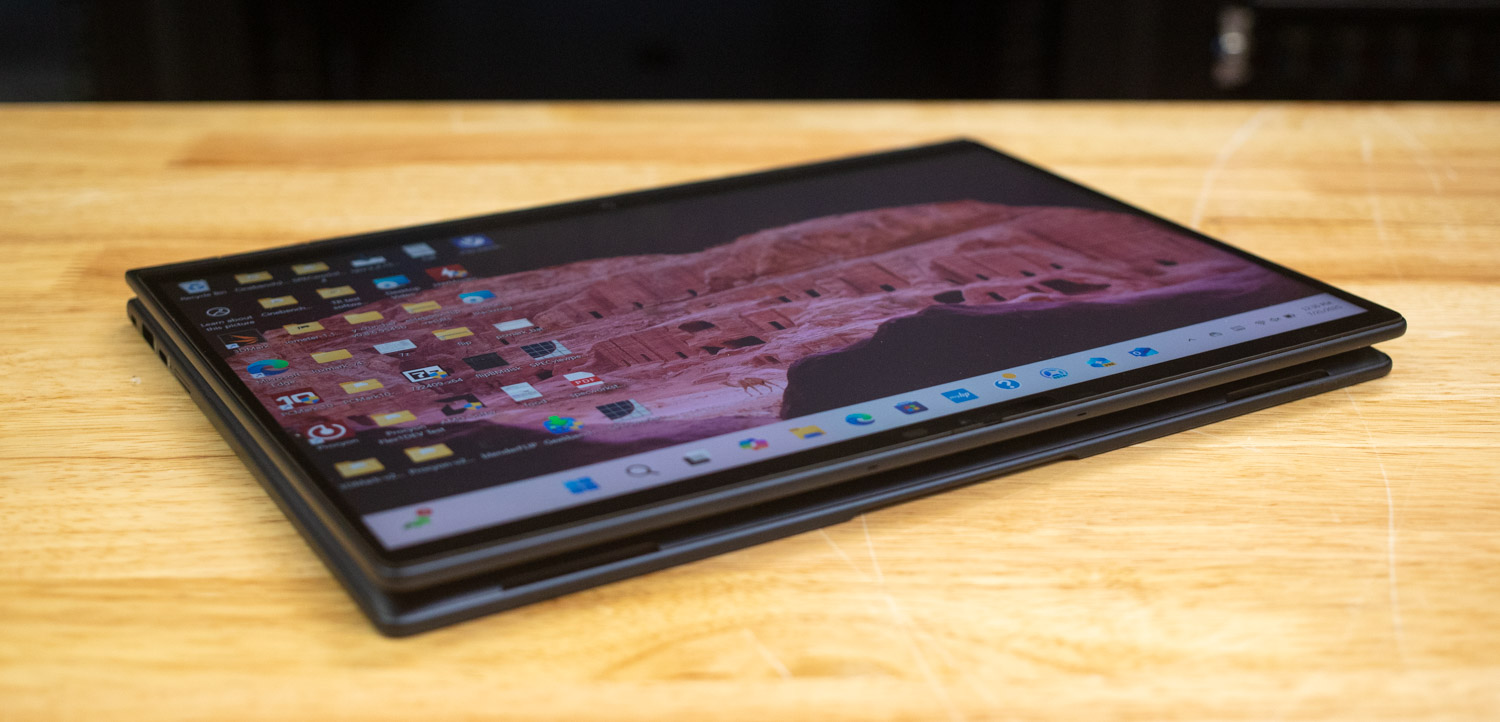
Between the two Intel-based HP EliteBook X G1i models, performance differences were minimal, with both delivering consistent results across AI workloads and general productivity. While CPU-intensive tasks revealed some limitations of the Intel Core Ultra 7 platform, these systems shine in areas that matter most to mobile professionals: security, manageability, and battery life. With nearly 24.5 hours of runtime on the Flip variant and over 23 hours on the standard model, HP sets a new benchmark for endurance in business-class laptops.
For users who prioritize all-day mobility without sacrificing enterprise-grade features, the EliteBook X G1i series stands out as one of the most power-efficient and secure options on the market.




 Amazon
Amazon